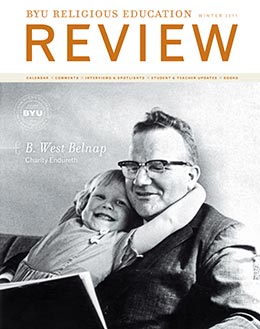BYU-Trained Chaplain Candidates
Outreach
Chad Thompson is a first lieutenant stationed at Fort Richardson in Alaska and an April 2010 graduate from BYU’s Chaplain Candidates program. Because he had taken a graduate class in world religions, Lieutenant Thompson was recently invited to host a group of Indian soldiers in a Hindu worship service. Thompson escorted them to a Hindu temple, where three local native Indian businessmen had elaborately decorated a room. Thompson was invited to participate, sitting in the back, cross-legged and barefoot, while all offered prayers in the form of a long mantra (chant). Next the leader of the group presented an offering in the form of uncooked rice (because they had no flowers). Then some candles were lit, and the participants placed their hands over the smoke, moving their hands over their faces and heads to symbolize the burning of the ego. Then the priests came around with colored powder mixed with oil to place a dot on the participants’ foreheads. Finally all received some traditional dried fruit and sweets as a Diwali gift.
“It was really fun,” Thompson wrote to program director Roger R. Keller, professor of Church history and doctrine, “and the Indian soldiers were surprised at my elementary knowledge about Hinduism. The class definitely came in handy.” Thompson also expressed appreciation for the preparation given by professors of marriage and family therapy (MFT), counseling psychology, and social work, adding, “Since being here just for a couple of months now, I have worked with soldiers on such issues as posttraumatic stress disorder, marriage counseling, depression, intimacy issues, suicide, stress, and sexual assault, among others.”
The Chaplain Candidates program is a cross-disciplinary two-year MA program administered by BYU Religious Education. The students take a minimum of seventy-two hours of course work, including thirty-six hours of graduate-level religion and classes in clinical pastoral education, counseling psychology, family systems theory, practice in basic counseling, psychopathology, and spirituality and psychotherapy.
Why does BYU sponsor this program? The answer is complex. Chaplains generally have their roots in their own religious tradition, but the LDS Church has no traditional seminary program (training for the ministry), which is expected of people going into chaplaincy. In the past, LDS candidates pursued a degree in a field such as marriage and family therapy and then thirty-six hours of graduate religion through a university. But the Department of Defense now requires that the seventy-hours be acquired through a one-degree program. In response to these new requirements, Elder Robert C. Oaks, a retired Air Force general who chairs the Military Advisory Committee, asked BYU to augment the existing Church Educational System program and reserve slots for chaplain candidates.
“The goal of the program,” says Brother Keller, “is to produce chaplain candidates who can work in a pluralistic religious environment. All must have pastoral hearts to work with people of other faiths and facilitate meeting their spiritual needs, providing spiritual support in that faith.” Essentially the chaplain candidates are to become multilingual, speaking the language of other religions and appreciating their religious traditions. As future chaplains, they will be the religious presence on a military base, charged with providing or finding religious services for everyone—Protestant, Catholic, Muslim, or Jew. Consequently, the students study other religious traditions and practice delivering nondenominational sermons.
Keller, who served as a chaplain at a Presbyterian college and as a Presbyterian minister before joining the LDS Church and teaching at BYU, says the greatest challenge is for LDS students to think outside their faith tradition, appreciating other people’s traditions without judging. In fact, the divide between LDS and other Christians is not as wide as some would assume.
Ironically, LDS chaplains sometimes face the challenge of being judged unfairly by chaplains of other faiths who may view LDS teachings as unorthodox. For example, one LDS chaplain was excluded from preaching to the congregation, but he chose not to take offense, greeting members of the congregation and introducing himself as a chaplain. After several weeks, members asked why this particular chaplain never preached. Fortunately, the other chaplains relented and allowed him to preach. Out of a tense beginning grew some close friendships.
At present there are seventy-one LDS chaplains on duty throughout the world. Frank W. Clawson, director of the Church Military Relations Department, LDS Chaplains, notes that while LDS chaplains may not proselyte, they are still ambassadors for the Church. “They ensure that each person in the military and their families are afforded religious freedom,” says Clawson. “They assist in strengthening members of [our] church as they serve in the military. And they work side by side with chaplains of other denominations in a congenial, ecumenical way.”
“Ideally, we would like every [LDS] chaplain candidate to go to BYU to receive a master’s degree in religious education,” says Clawson, “It’s an opportunity for military chaplains who are members of the Church to be grounded in LDS theology and doctrine. With the elective courses in this new program and in other disciplines at BYU, they’re going to come into the chaplaincy with some excellent training.”
